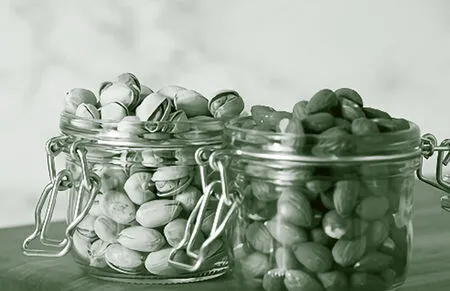A New Brooklyn Store Designed for Zero Waste减少食物浪费,从一家小店做起
⊙ By Adam Wernick ⊙ 翻译:T Boy
我们都知道,纽约是一个高消费城市。高消费的其中一个后果常常是大量的垃圾和严重浪费。但在纽约,有些人并不觉得这些是理所当然的事。他们正尽一己之力,为改变这种现象而努力。尽管他们还不是纽约的主流,但他们也在悄悄地改变着纽约的形象。
1) fridge [frɪdʒ] n. 冰箱


Host: If you’re like most people, you probably have a1)fridge and cupboard with a number of half-used packages. Even if you only need a cup or two of some ingredient, it comes by the2)pound or3)quart.And all too often, eventually what’s left goes4)stale and into the5)garbage. That waste was part of the reason Sarah Metz decided to6)launch a store called “The Fillery.” It’s designed to reduce waste and save money.You see, at The Fillery, shoppers will bring their own7)reusable containers and only buy what they need.
So, tell us about The Fillery. What kinds of goods are you planning to sell?
Sarah: We’ll have everything from nuts and seeds to baking ingredients, whole grains,coffee and tea, probably more than 100 different spices. And we’ll also have liquids like8)syrup and oil and vinegar, even a few household cleaning products will be9)available for10)refill.
Host: What inspired you to open this store?Sarah: I’ve been an eco-conscious person for a long time, and I moved to Brooklyn about 10 years ago, and, when I saw the amounts of waste being11)generated in New York City, I was just12)shocked. I thought back to a store I shopped at in Michigan, and it was a small bulk store, and I really loved that concept, and, still, after 10 years of living in my neighborhood, nothing like that exists.So, I just decided to do it myself.
Host: So how much waste do stores typically produce, Sarah? What are we talking about here?
Sarah: Right, that varies quite a bit depending on what type of store you’re talking about or what type of business. But a report that was in Politico13)estimates that waste collection trucks14)haul approximately 10,000 tons of business waste every single day in New York,so you can imagine there are probably a very conservative estimate would be 100,000 businesses, so, about 200 pounds per business per day on average.
Host: So, how much do you expect to reduce food waste? We see figures that about a third of all food is wasted, one way or another.
Sarah: Right! I think that teaching people to buy only what they need is gonna be a big part of that. Community education is a big part of what we hope for The Fillery to offer, and part of that will be teaching people how to plan their meals and how to buy in quantities that are useable for them before the product goes bad. So, we are hoping that that will contribute to reduction of food waste.
Host: Hey, what will you do when people come to your store without containers? I mean that’s likely to happen.
Sarah: It is very likely to happen, and I think that’s one concern that many people haveis just the15)feasibility of carrying around their own containers if they’re not necessarily planning to go grocery shopping. We will have16)compostable paper bags available for dry goods, for free, for all customers. We will also have other containers for purchase, so everything from17)jars and tins and bottles for the liquids. Nothing plastic.
2) pound [paʊnd] n. 磅(重量单位,约0.454千克)
3) quart [kwɔːt] n. 夸脱(液体计量单位,约1.14升)
4) stale [steɪl] adj. 不新鲜的,陈旧的
5) garbage [ˑɡɑːbɪdʒ] n. 垃圾,垃圾箱
6) launch [lɔːntʃ] v. 开始
7) reusable [riːˑjuːzəbəl] adj. 可再用的,可重复使用的
8) syrup [ˑsɪrəp] n. 糖浆
9) available [əˑveɪləb(ə)l] adj. 可得到的,可利用的
10) re fi ll [riːˑfɪl] n. 再装满
11) generate [ˑdʒenəreɪt] v. 产生
12) shocked [ʃɒkt] adj. 震惊的
13) estimate [ˑestɪmeɪt] v. 估计
14) haul [hɔːl] v. 拖,拉
15) feasibility [fiːzəˑbɪlətɪ] n. 可行性,可能性
16) compostable [kɒmˑpɒstəbl]adj. 可堆肥的
17) jar [dʒɑː(r)] n. 坛子,广口瓶

见招拆招
And all too often, eventually what’s left goes stale and into the garbage.
All、too和often三个副词加在一起,似乎让人很难分清楚哪个是主,哪个是次,要弄明白意思就更难了。其实,all too是一个固定搭配,作“太,实在太”解,后常跟各种形容词和副词,强调程度。在本文的例句中,解决了all too这个问题,我们就知道all too often就是“经常,时常,常常”的意思,指事情发生的频率非常高,如:
● She is all too ready to accept the job.(她太想要那份工作了。)
● All too often, kids trust their teachers more than others.(大多数时候,孩子信任老师多于他人。)
参考译文
主持人:如果你的做法和其他大部分人一样的话,那你的冰箱和橱柜里可能会有不少食物只装了一半的包装盒。即使你只需要一两杯某种烹饪原料,但它也是以磅或夸脱为单位售卖的。更多的时候,里面的食物会慢慢变得不再新鲜,被扔进了垃圾箱。这种浪费现象正是莎拉·梅茨决定开店的部分原因,她的店名叫The Fillery。这家店旨在减少浪费,并且为你省钱。你瞧,在这家店里,购物者会自己带来可重复使用的容器,并且只购买自己需要的数量。
那么给我们讲讲The Fillery这家店吧。你打算在店里卖哪些商品?
莎拉:嗯,什么都有,坚果和瓜子、烘焙原料、全谷类食物、咖啡和茶,大概会有一百多种调味品。我们也会出售液体商品,如糖浆、油和醋,甚至有好几种家居使用的清洁用品也可续买。
主持人:是什么促使你开这样一家店呢?
莎拉:很长时间以来,我有较强的生态意识。我大约在十年前搬到布鲁克林,了解了纽约市产生的垃圾量后非常震惊。我回想起我在密歇根州住时去购物的一家商店,那是一家售卖散装商品的小店,我非常喜欢那种做法。可是我在自己的住宅区生活了十年,还是没有看到类似的商店。于是我就决定自己干了。
主持人:那通常来说,莎拉,一般商店会产生多少垃圾呢?我们在谈论的究竟是一个什么样的状况呢?
莎拉:嗯,商店或企业的类型不同,情况会很不一样。不过,《政客》杂志上的一篇文章估计,在纽约,垃圾收集车每一天运送的企业垃圾大概是一万吨。那你就可以想一下,一个非常保守的估计是纽约有十万家企业,也就是说每家企业平均一天会产生两百磅垃圾。
主持人:那么你预计你的店能减少多少食物浪费呢?我们看到的一些数据表明,大约有三分之一的食物会以不同的方式被浪费。
莎拉:对!我认为,教育人们只买自己需要的量是很关键的。我们希望在The Fillery提供的服务中,社区教育能成为一个重要的部分。我们会教人们如何计划自己的餐饮,如何确保购买的数量可以在食物变质前食用完。我们希望这样做会有助于减少食物浪费。
主持人:嘿,如果来店里的顾客没有带容器你们会怎么做?我的意思是,这情况很可能会发生呢。
莎拉:非常可能发生。我想许多人都会有这个顾虑:如果他们事先没有打算去买食品,那把自家的容器随身携带的做法并不现实。我们店会向所有顾客免费提供装干货的环保纸袋,这些纸袋可通过堆肥进行处理;我们也会出售其他容器,包括盛放液体的坛子、金属罐和瓶子等,但不会提供塑料容器。

